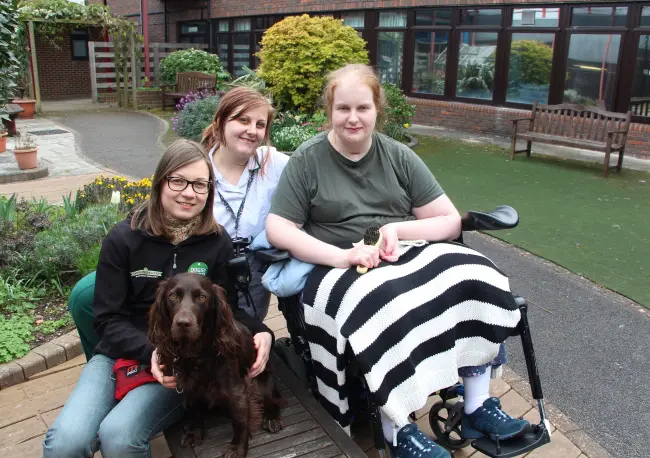Patients at the National Spinal Injuries Centre (NSIC) at Stoke Mandeville Hospital are set to benefit from a pioneering new scheme which will see dogs used to aid their rehabilitation.

Stoke Mandeville Dogs for Good project Therapy Dog Danny, handler Iris Smolkovic, occupational therapist Alicia Hing, patient Charlotte Simcock
Buckinghamshire Healthcare NHS Trust and the charity Dogs for Good have joined forces for a pilot project which will see how specially trained dogs can help patients in their recovery. The new treatment practice, Animal Assisted Intervention (AAI) is a well-established practice in many parts of the world, but is less advanced in the UK.
Charlotte Simcock, 26, has been a patient at the NSIC since January and is due to leave in July. In October 2016 she suffered a spinal stroke which has left her with limited movement from the chest down. She is keen to regain better movement in her arms to enable her to feed herself. She is also hoping to increase her confidence going out into the community in her wheel chair.
Through a series of tasks such as throwing a ball, tugging a toy, and grooming are included in carefully planned sessions designed to help progress Charlotte towards her goals and support her rehabilitation.
The pilot will last for eight weeks and will consist of weekly one hour sessions and involve a trained therapy dog Danny and specialist handler Iris Smolkovic working alongside an occupational therapist Alicia Hing and Ruth Peachment.
Charlotte, who worked as a veterinary nurse before her illness, is excited to be part of the project.
She said: “I have a dog at home who I am really missing while I am in hospital. I can’t wait to get started on this and am so pleased I was chosen to be part of the trial. I am sure this will really help me improve my mobility and will also help me to gain the confidence I need to get out and about once again.”
The project will explore the following potential benefits:
- The motivational factor of the dog in engaging patients in their occupational therapy programme.
- The role of the dog in engaging patients in effective occupational therapy sessions, does the dog promote an improved level of effort or duration?
- The effectiveness of AAI techniques in the achievement of occupational therapy
As well as these benefits other areas will also be looked at including the patient’s wellbeing and happiness during this period and the impact on occupational therapy resources.
Ruth Peachment, occupational therapy clinical specialist at the NSIC, said: “This is a very exciting pilot that we have been planning for some time with Dogs for Good. The potential to help and motivate patients is huge. If the pilot is successful we are hoping to extend the scheme to help children too.”
Dogs for Good, which is based in Banbury, also trains assistance dogs to help adults and children lead more independent lives, at home and in the community.
Hayley Stimpson, AAI Services Development Adviser at Dogs for Good, said: “We are passionate about what can happen when we bring people and dogs together. We are keen to see how effective animal assisted intervention techniques will be in helping patients to achieve their rehabilitation goals, and whether it will enable them to progress more quickly than anticipated.”